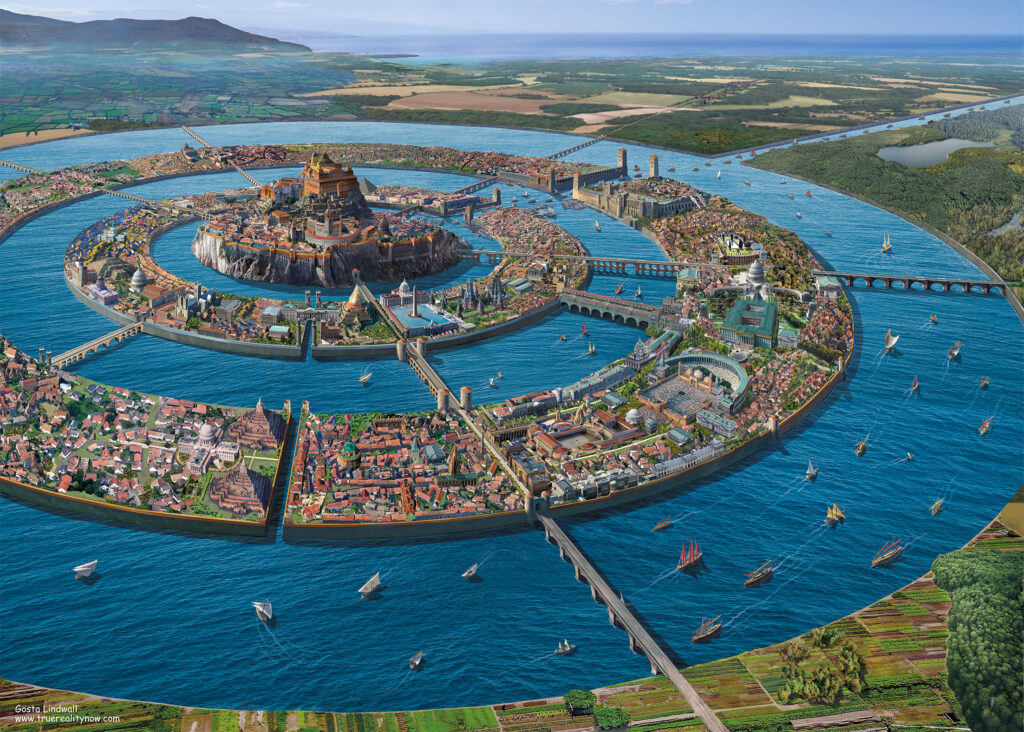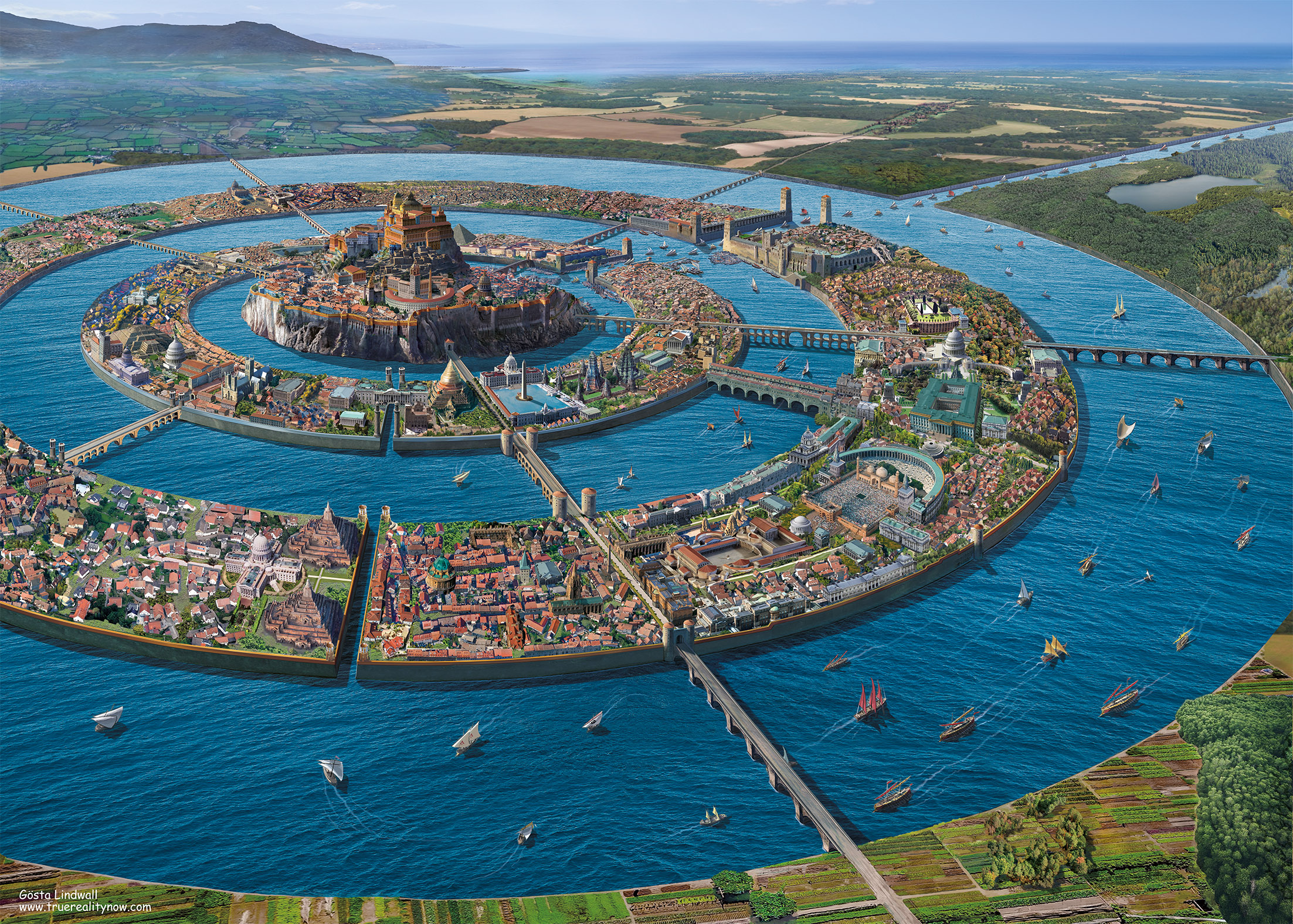
Atlantis: Unveiling the Mysteries of the Lost City
The legend of Atlantis, a technologically advanced and utopian island civilization swallowed by the sea, has captivated imaginations for millennia. From Plato’s initial descriptions to countless modern interpretations, Atlantis represents both a historical enigma and a potent symbol of human ambition and its potential consequences. This article delves into the origins of the Atlantis myth, examines the evidence (or lack thereof) supporting its existence, and explores the enduring cultural impact of this legendary lost city.
The Origins of the Atlantis Myth
The primary source for the story of Atlantis is Plato’s dialogues Timaeus and Critias, written around 360 BC. In these works, Plato recounts a tale passed down through generations, purportedly originating from the Egyptian priest Sonchis of Sais. According to Plato, Atlantis was located “beyond the Pillars of Hercules” (presumably the Strait of Gibraltar) and was a powerful naval empire that challenged ancient Athens. He described Atlantis as a wealthy and advanced society with sophisticated technology, impressive architecture, and a complex social structure.
However, Atlantis’s hubris and lust for power eventually led to its downfall. The Atlanteans attempted to conquer Athens but were defeated. As punishment for their arrogance and aggression, the gods sent earthquakes and floods that submerged Atlantis beneath the waves, erasing it from history. Plato intended Critias to be a detailed account of Athenian society overcoming Atlantis, but the dialogue remains unfinished, leaving the true intent of Plato’s vision open to interpretation.
Searching for Atlantis: Evidence and Theories
Despite Plato’s seemingly fictional narrative, the allure of Atlantis has prompted numerous searches and theories about its potential location and historical basis. Over the centuries, countless researchers, adventurers, and pseudo-scientists have proposed various sites as the possible location of the lost city. These locations span the globe, from the Mediterranean Sea to the Atlantic Ocean, and even as far as Antarctica.
The Mediterranean Theory
One of the most popular theories links Atlantis to the Minoan civilization of Crete. The Minoans were a highly advanced Bronze Age society that flourished on the island of Crete from around 2700 to 1450 BC. They possessed a sophisticated writing system, impressive palaces (such as Knossos), and a powerful maritime fleet. The Minoan civilization abruptly collapsed around 1450 BC, possibly due to a volcanic eruption on the nearby island of Thera (modern-day Santorini). [See also: Minoan Civilization: A Lost World?]
Proponents of the Minoan theory suggest that the Thera eruption, which caused a massive tsunami and widespread destruction, may have been the cataclysmic event that inspired Plato’s story of Atlantis. They argue that Plato may have embellished the details and exaggerated the scale of the disaster, transforming a real historical event into a legendary tale. Furthermore, similarities between Minoan art and architecture and Plato’s descriptions of Atlantis have been cited as supporting evidence.
The Atlantic Ocean Hypothesis
Another prominent theory places Atlantis in the Atlantic Ocean, as suggested by Plato’s original account. Some researchers have pointed to underwater geological features, such as the Azores Plateau, as potential remnants of a submerged landmass. Others have proposed that Atlantis may have been located on a now-sunken island or continent in the mid-Atlantic Ridge. However, there is no scientific evidence to support the existence of a large landmass that sank into the Atlantic Ocean within the timeframe described by Plato.
Other Proposed Locations
Over the years, numerous other locations have been suggested as the site of Atlantis, including Spain, Ireland, the Canary Islands, and even South America. However, these theories are often based on speculative interpretations of historical texts, archaeological findings, or geological data. None of these proposals have garnered widespread scientific support.
The Enduring Appeal of Atlantis
Despite the lack of concrete evidence, the myth of Atlantis continues to resonate with people across cultures and generations. Its enduring appeal can be attributed to several factors:
- The allure of a lost civilization: The idea of a technologically advanced and utopian society that vanished without a trace is inherently intriguing. It sparks curiosity about the possibilities of human achievement and the fragility of civilization.
- The moral lesson: Plato’s story of Atlantis serves as a cautionary tale about the dangers of hubris, greed, and unchecked ambition. It reminds us that even the most powerful civilizations can be brought down by their own flaws.
- The search for the unknown: The quest to find Atlantis represents the human desire to explore the unknown and uncover hidden truths. It taps into our innate sense of adventure and our fascination with mysteries.
- Symbolism: Atlantis has become a symbol for lost knowledge, advanced technology, and a utopian society. It represents a yearning for a better world and a belief in the potential for human progress.
Atlantis in Popular Culture
The legend of Atlantis has permeated popular culture, inspiring countless books, films, television shows, video games, and other forms of media. From Jules Verne’s Twenty Thousand Leagues Under the Sea to Disney’s animated film Atlantis: The Lost Empire, the story of the lost city has been reimagined and adapted in numerous ways. These adaptations often explore themes of technological innovation, environmental destruction, and the clash between civilization and nature. [See also: Atlantis in Film: A Cinematic Journey]
Conclusion: Fact, Fiction, or Something In Between?
While there is no definitive scientific evidence to prove the existence of Atlantis, the myth continues to fascinate and inspire. Whether it was based on a real historical event, a metaphorical allegory, or a complete fabrication, the story of Atlantis has left an indelible mark on human culture. The ongoing search for Atlantis serves as a reminder of our enduring curiosity, our capacity for imagination, and our persistent quest to unravel the mysteries of the past.
Ultimately, the true significance of Atlantis may lie not in its historical accuracy, but in its enduring power as a symbol of human potential, the dangers of unchecked ambition, and the enduring quest for knowledge and understanding. The tale of Atlantis serves as a timeless reminder that even the most advanced civilizations can be lost to time, and that the pursuit of wisdom and balance is essential for the survival of humanity.
The legend of Atlantis, whether fact or fiction, provides a valuable lens through which to examine our own society and our place in the world. It encourages us to reflect on the choices we make, the values we uphold, and the legacy we will leave behind. Atlantis remains a powerful and enduring symbol that continues to inspire and challenge us to this day.

